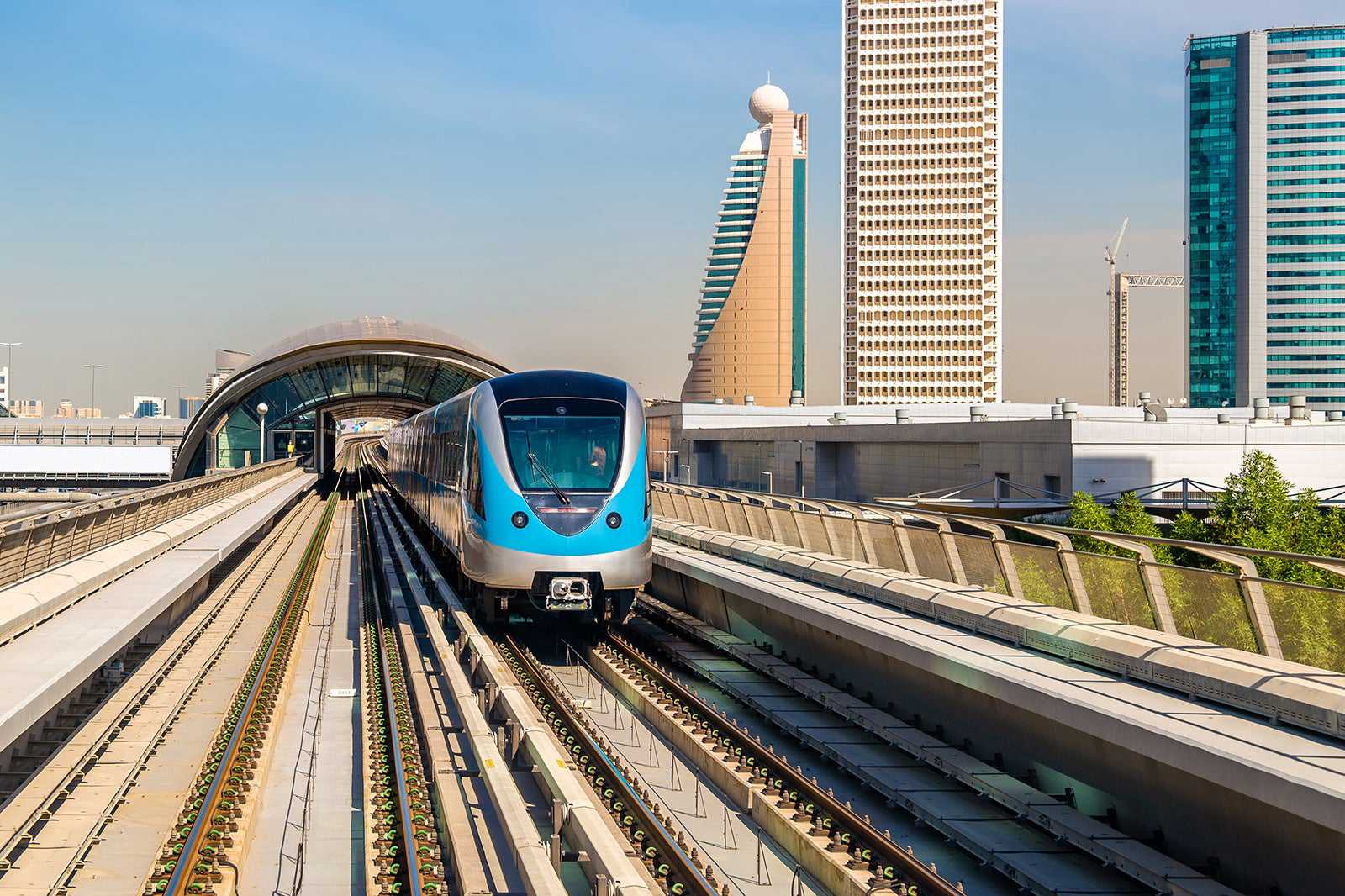Our Dubai travel essentials include the best times to travel, the weather, the climate, and other things you may need to know to visit this city. We'll examine the currency, the type of electrical outlets and plugs needed, even the international dial code and how to make an emergency phone call. We will look at travel within the city, from where the airport is to finding your hotel and navigating to popular points of interest.
Dubai is a vibrant city with tons to do. We'll check out festivals and major sites to see, so you can make your vacation in Dubai one to remember.
When is the best time to travel to Dubai?

- Dubai's climate is classified as a hot desert climate, with two seasons: summer and winter. Summer runs from April to September, and winter begins in October.
- The most rainfall can be seen in February, averaging around 3.58 cm, followed by an average of 2.24 cm in March.
- The warmest months of the year are May to September, when the average temperature ranges from 35° celsius to 40.6° celsius.
- The best time to visit in terms of weather is from November to March, when temperatures are the coolest. Come during the summer months to escape the crowds, but be prepared for sweltering heat.
Dubai basics

- Plug type: G
- Electricity: 220V-240V
- Currency: United Arab Emirates Dirham (AED)
- International dialing code: +971 4
- Emergency telephone number: 999
See also
- 10 Best Museums in Dubai

10 Best Museums in Dubai
United Arab Emirates - 10 Best Beach Clubs in Dubai

10 Best Beach Clubs in Dubai
United Arab Emirates - 10 Best Shopping Malls in Dubai

10 Best Shopping Malls in Dubai
United Arab Emirates
How to get to my hotel in Dubai?

Dubai is a highly cosmopolitan city with a vast population of visa-holders and expatriates from other nations. This means it's very easy to get around and is friendly and welcoming to visitors. The UAE, in general, has a fantastic infrastructure for getting around from airports to public bus services, streetcars, monorails and the Metro.
Airports
The major airport in Dubai is the DXB Dubai International Airport. It's one of the busiest airports in the world, with tons to see and do in the airport itself. Many hotels have shuttle service to and from the airport, but you may need to book in advance. Check with your hotel for information. Otherwise, you can catch a taxi cab or take a rideshare. Automobile hires can also be found to drive yourself into town. The city centre is only about 20 minutes drive southwest of the airport.
Major train stations
Dubai is not serviced by significant rail transportation between Emirates at this time. The Emirates plan to remedy that with the first national passenger and freight network, which is currently under construction and expected to be complete by 2024.
Ports
Dubai is on the Persian Gulf, so several major ports service it. These include Port Jebel Ali, Mina Rashid and Mina Al Hamriyah. Of these, the latter two are designed for commercial and passenger transportation, while Jebel Ali is one of the busiest cargo ports globally.
How to get around Dubai?

Travel tips
Traveling around Dubai is like a dream, with a wide range of options available and all easily accessible. The principal methods of transportation are public (taxi cab, metro, bus and the like), water-based (abras, water taxi cabs, canal ferries and cruises) and private (rideshares, tours and automobile hires). Visitors are advised to mix up their transportation options and seek the best means of visiting any individual point of interest they wish.
Subway system
The Dubai metro is among the easiest and quickest ways to get anywhere in town. These trains are driverless and run automatically every few minutes throughout 7 zones. Everyone over the age of 4 (ages 5 and up) will need to buy a Nol Card, which you can pre-load with credits if you want to avoid queuing in long lines, or you can pay per ride. Nol Red Tickets are for short-term visitors, while NOL Silver Passes are for longer-term visitors and residents. A Nol Gold First Class option is the best to avoid all the crowds but carries an additional fee.
Taxi cab and rideshare apps
Taxi cab services are probably the easiest way to get around Dubai. They can sometimes take longer than other forms of transportation because Dubai tends to have a lot of traffic. The prices are generally reasonable and can quickly be booked or hailed from most hotels, attractions and shopping malls. Look for yellow lights, which signify a taxi cab is available to take fares. Rideshare apps such as Careem and Uber are also available. They cost a bit more than taxi cabs, but are more convenient, especially for groups.
Bus network
Dubai offers an expansive bus network that also operates on the Nol Card. It's more often used by locals than visitors but reaches some more remote neighborhoods of town that the metro doesn't service. The RTA offers a Wojhati app to help you figure out the best routes to navigate.
Automobile Rentals
Automobile hires in Dubai are available from many local companies such as the Dubai Marina, Enterprise Rent-a-Car, Hertz, and others. The Dubai Airport or your hotel can often help you find a car rental that's right for your needs. You may even be able to book one in advance through your travel site when you book your flight and lodging. Driving can be the only way to reach some locales, but in general, be aware that Dubai is infamous for its traffic, and you will need to account for things like finding and paying for parking. For most people, public transportation suffices.
Bicycle Rentals
Dubai does have several bicycle rental companies if you are into exploring by cycling around. However, it's important to note that bicycles are not permitted on roads where speeds exceed 60 km/hour, on designated pedestrian lanes, or jogging tracks. Designated cycling tracks are available in many places. However, you do not need a special license to ride a bicycle in Dubai. For many, the sheer heat alone makes bicycle travel less attractive than automobile hires, rideshares, taxi cabs or public transit.
What are the main annual events in Dubai?

Emirates Airlines Annual Festival of Literature
- Held every February
- This festival celebrates literature and reading from all over the world with a focus on the UAE. It includes readings, workshops, visiting authors, speakers, seminars and symposiums.
- Where: Al Habtoor City, 8 minutes south of the city centre
Dubai Comedy Festival
- Held Every May
- This festival highlights local and international comedians from all over. Stand-up, skit, musical, and many other forms of live comedy entertainment are held at several venues all over Dubai.
- Where: All across the city
InClassica International Music Festival
- Held from the end of August to September
- This festival celebrates music in all its forms and bills itself as "The World's Biggest Musical Observatory". You can see some of the most famous musicians in the world perform next to some of the hottest up-and-coming local talent representing all genres in the spirit of international friendship and cooperation.
- Where: Events are held at the Dubai Opera and the Coca-Cola Arena in the heart of the city centre.
What are the main landmarks in Dubai?

Dubai Mall
The Dubai Mall is among the largest shopping malls globally, with well over 1,000 shops, eateries, services and opportunities for entertainment. Not only can you find just about every brand you want here, but you can also visit a full indoor aquarium, ride rides and catch live shows, all in the city centre.
Ski Dubai
Ski Dubai is an indoor snow park where you and your family can go snowboarding, skiing, bobsledding or enjoy other winter fun in the middle of the desert. You can rent gear and suits and even take lessons. Other activities include snow bumper automobiles, restaurants, shops, a playground and an ice cave.
Kite Beach
Kite Beach is popular with families and couples. It's named because it's a popular beach among kite surfers and spectators of this exciting sport. It's a windy beach, and while the current makes for less than ideal bathing, the soft sand and fantastic views make for a great romantic stop.
Burj Khalifa
The Burj Khalifa is among the tallest skyscrapers in the world, with one of the highest viewing platforms anywhere with astounding views 830 meters above the ground. At the base, the Dubai Fountain showcases a choreographed water, light and sound show cycling 22,000 gallons of water dancing up to 150 meters in the sky.
What are the main towns and villages around Dubai?

Abu Dhabi
Abu Dhabi is the capital of the UAE and the second-most populous city in the country. It's only an hour away from Dubai and is every bit as cosmopolitan, offering a wide range of historic attractions, shopping, dining and entertainment for couples, groups and families alike. You can see sites like the Mariam Umm Elsa Mosque, the Emirates Palace, the Corniche, Yas Waterworld Abu Dhabi, Jubail Mangrove Park, Louvre Abu Dhabi, and Ferrari World Abu Dhabi.
Hatta Village
Hatta Village is a traditional, quaint mountain heritage village near the top of the Hatta Mountain where you can enjoy authentic local cuisine and absorb the genuine local culture. Just minutes away from the village, you can safari to see mountaintop views of the surrounding area, relax in local freshwater pools and capture stunning photographs at the Hatta Dam. You can even take guided tours of this region to learn about its history and culture and the important role it plays in local history.
Jebel Ali
Jebel Ali is a famous town in southwestern Dubai, just 35 km from the city centre. It's close to the airport and an easy jaunt from the Dubai Metro. This village was founded in 1977 and boasts a population of over 31,000 people. It's home to many attractions like beaches with white sand and clear waters, shopping malls, statues and historic monuments and tons of urban parks where you can get away from the hustle and bustle for a while.
Al Aweer
Al Aweer is about 30 minutes east of the Dubai city centre. It's famed chiefly for its Bird Sanctuary, where you can see hundreds of birds representing dozens of species. It's also the home of a popular farmers' market offering fresh produce, meats, cheeses and bakery items. From here, you can sign onto a desert safari to get out into the dunes and see the desert ecology or learn about Bedouin life. You can also spend quiet time in Al Nakheel Park.
This article includes opinions of the Go Guides editorial team. Hotels.com compensates authors for their writing appearing on this site; such compensation may include travel and other costs.
Start planning your trip
Where to stay in Dubai
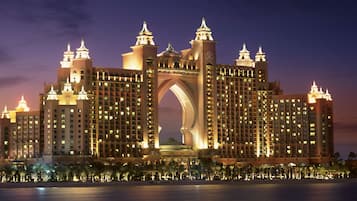
Atlantis, The Palm

Atlantis The Royal
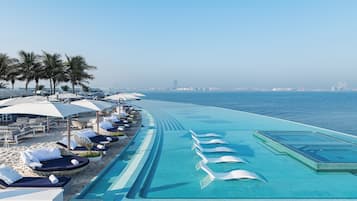
Jumeirah Burj Al Arab Dubai
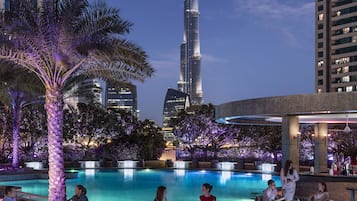
Shangri-La Dubai
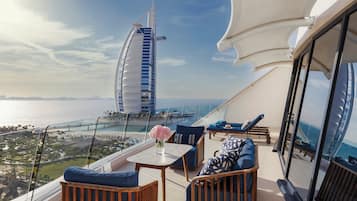
Jumeirah Beach Hotel Dubai
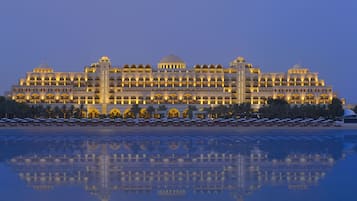
Jumeirah Zabeel Saray Dubai
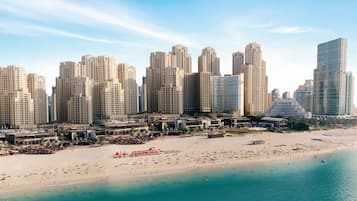
JA Ocean View Hotel, Jumeirah Beach Dubai

Radisson Blu Hotel Dubai Waterfront

NH Collection Dubai The Palm
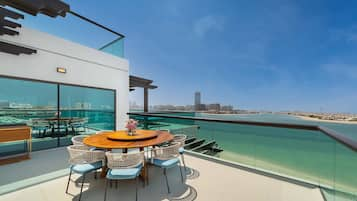
Taj Exotica Resort & Spa, The Palm, Dubai
Related stories
- 10 Best Museums in Dubai

10 Best Museums in Dubai
United Arab Emirates - 10 Best Beach Clubs in Dubai

10 Best Beach Clubs in Dubai
United Arab Emirates - 10 Best Shopping Malls in Dubai

10 Best Shopping Malls in Dubai
United Arab Emirates - 10 Best Things to Do in Dubai

10 Best Things to Do in Dubai
United Arab Emirates - 10 Best Family Things to Do in Dubai

10 Best Family Things to Do in Dubai
United Arab Emirates - 10 Things to Do in Dubai on a Small Budget

10 Things to Do in Dubai on a Small Budget
United Arab Emirates - 9 Great Restaurants in Dubai

9 Great Restaurants in Dubai
United Arab Emirates - 10 Best Things to Do After Dinner in Dubai

10 Best Things to Do After Dinner in Dubai
United Arab Emirates
